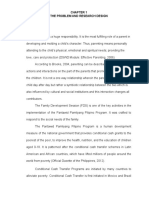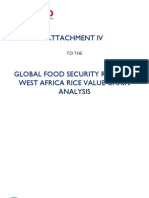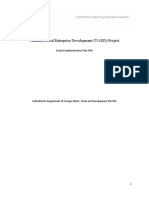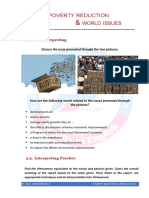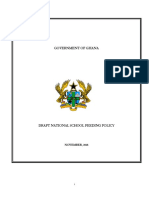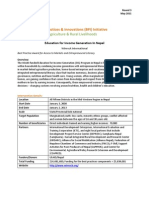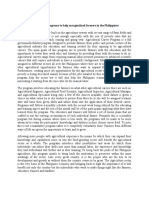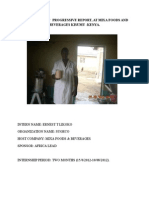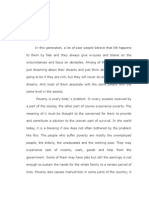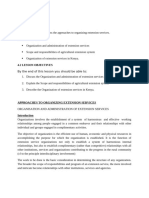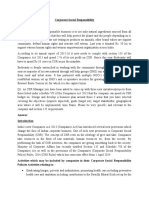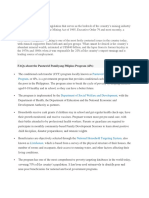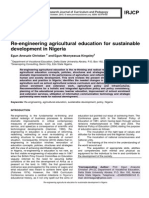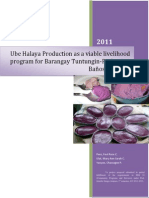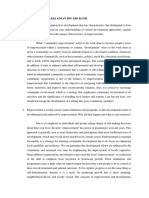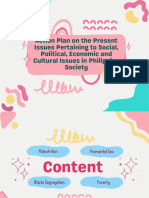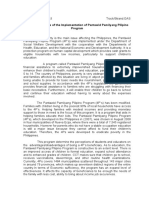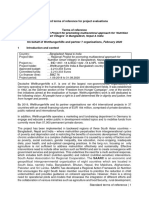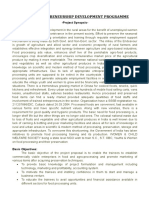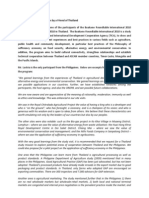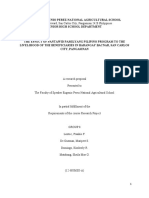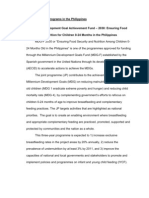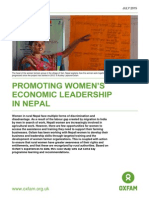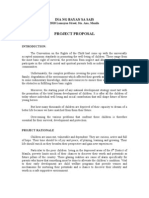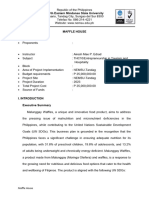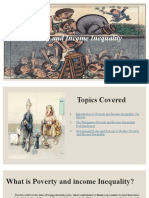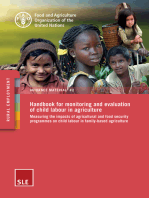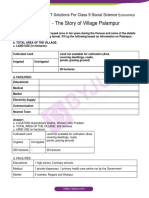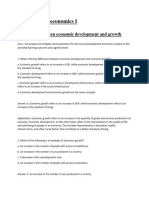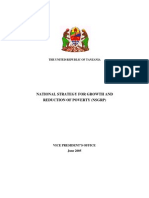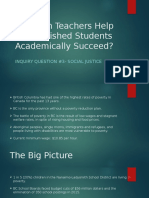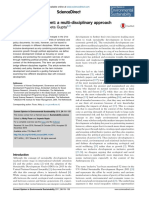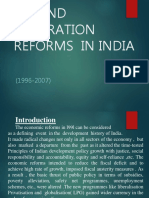Mushroom Production Training For Disabled People
Mushroom Production Training For Disabled People
Uploaded by
Hai ToanCopyright:
Available Formats
Mushroom Production Training For Disabled People
Mushroom Production Training For Disabled People
Uploaded by
Hai ToanOriginal Title
Copyright
Available Formats
Share this document
Did you find this document useful?
Is this content inappropriate?
Copyright:
Available Formats
Mushroom Production Training For Disabled People
Mushroom Production Training For Disabled People
Uploaded by
Hai ToanCopyright:
Available Formats
Mushroom production training for disabled people: a progress report
Summary
Thailand offers enabling policies for people with disabilities, and the Royal Family has always actively supported government projects involving disadvantaged people. FAO decided to join the Thai government in a commitment to improve the livelihoods of rural disabled in a step towards poverty alleviation and sustainable development. The FAO-initiated project Mushroom Production Training for Disabled People is located in the Northeastern Training Center for People with Disabilities in Ubon Ratchathani. Mushrooms were favored because they offer good market opportunities, as they are part of the daily Thai diet. Furthermore, they can be cultivated by physically and mentally disabled people and can be started at a very low cost while generating income within a short term. One of the main objectives of the project was to establish economic self-reliance for rural disabled as entrepreneurs. FAO assisted in strengthening capacity of the local institution for training rural disabled. The purpose of the training was to prepare people with disabilities for equal participation in social and economic development at family and community level. Training further offered the opportunity for disabled people to prove their ability. It is easy to see someone's disability but much more difficult to see their capability. Specific selection and training methodology were developed to answer specific needs and to ensure replication and sustainability following training. Alternative ways of accomplishing certain tasks needed to be development to cater to specific disabilities. Motivational sessions as part of the training, highly contributed to personal development. Every step involved in mushroom cultivation was reviewed during training including entrepreneurship and environmental protection. Forty-seven trainees successfully completed the 60 days training. Trainees, upon completing their training, went home and transferred acquired know-how to their family and community. All trainees have already set-up their mushroom houses, and are now ensured of daily food and income. They have gained self-reliance and self-sufficiency to become active participants in their community. Five trainees returned to the center to become trainers and assist the five trainers who work under the Department of Public Welfare. Trainers acquired new skills for enhancing capacities of rural disabled as entrepreneurs. Appropriate construction designs were introduced for trainees to set-up their mushroom enterprise, using readily available materials thus lowering set-up costs substantially. As a demonstration of self-confidence, six disabled trainees married and established their joint enterprise. This project's success can be attributed to the commitment of the Thai government, FAO, consultants and project team members. The Department of Public Welfare already indicated the intent to replicate this training program at its Center in Nong Khai. FAO is preparing monitoring and evaluation tools along with training manuals to ensure feasibility, sustainability, and successful replication in future local and regional projects.
Introduction Thailand is one of the few countries in South East Asia that developed and applied legislation towards the welfare and rehabilitation of people with disabilities. It has an estimated 1.1 million people or 1.8 percent of the population that are disabled with the majority (409,000) located in the Northeast, the poorest part of country. Already in the Fifth and Sixth National Development Plans, dating back to early 1990's, special measures were taken to rehabilitate disabled people and help them become economically self-reliant. The Department of Public Welfare has several programs for capacitating people with disabilities. Incentives are offered to companies who accept to train and employ people with disabilities while interest-free loans are available for people with disabilities who wish to start their own business. Existing training centers are not readily accessible for people with disabilities; most being located in large cities particularly Bangkok. To separate people with disabilities from their family and community is neither economically nor emotionally productive. People with disabilities should be allowed to remain within their community and become active members of society. Not only does income generation help support the family but it also brings back self-esteem and selfconfidence while alleviating the burden of disability from both family and society. More programs need to be set-up in rural areas offering conventional training in agro-industry and farming related sectors. The Royal Family plays an essential role in supporting various projects around Thailand, always expressing deep concern for disadvantaged people. Since the Asian economic crisis, His Majesty the King has been promoting "Economic Self Reliance" for the country and its people. Disabled people also need to become economically self-reliant in order to regain self-confidence and reintegrate into society as full participants. It is opportune that Thailand be the venue for establishing such a project in this auspicious year of the sixth cycle of His Majesty the King. FAO is constantly developing new approaches and strategies towards poverty alleviation and sustainable development. Several divisions are collaborating to support the poorest of the poor, disabled people in rural areas. Through its focal point Mr. Lawrence W. Jacobson, FAO decided to initiate a project for people with disabilities. A meeting was arranged between Mr. Jacobson and Senator Narong Patibatsarakich who had similar objectives. They soon realized that FAO could assist Thailand in an agriculture-related program for people with disabilities. A program in commercial horticulture aiming at income generation for people with disabilities in rural areas was therefore developed by FAO; to train people with disabilities in mushroom cultivation. Following the approval of FAO Director General Mr. Jacques Diouf, project implementation started in February 1999.
Mushrooms are part of the daily menu for people of Thailand. Most people love mushrooms; to collect them; to seek wild mushrooms; people love to eat mushrooms. Mushrooms can be cultivated on a small and larger scale to allow personal consumption or commercial enterprise. This can serve as supplemental or major source of income, depending on the size of the
farming activity and the number of mushroom houses. People with physical disabilities are fully capable of accomplishing all required tasks necessary in mushroom cultivation, although sometimes some modifications in techniques, handling, tools and equipment may be required. Furthermore, mushrooms grow under the shade thus reducing physical exertion associated with open cultivation such as rice and small fruits. It can also be performed by mentally disabled people since it requires repetitive activities that can easily be learned. Research and development can be further included for those people capable of conducting research. Mushroom cultivation offers a wide range of activities that can be suited for people with various needs, interest and capabilities. Mushroom cultivation can be started at a very low cost. In Ubon Ratchathani, a mushroom house capable of holding 1 000 mushroom bags can be built for between 500 Baht and 2 000 Baht depending on the creativity of the constructor in using readily available and appropriate material. Mushrooms can be produced within 2 - 4 months and can be sold fresh on the local market. Spawns or seeds and spawn bags can be bought at a reasonably low cost thus offering an acceptable profit margin. Mushrooms being highly perishable, they need to be sold rapidly or can be processed into various types of food as to give it an added value. Market opportunity is essential and is verified through constancy in demand for mushrooms and stability in price over the years. For example, the most common and easy to grow varieties of mushrooms in Ubon Ratchathani are Pleurotus (Oyster mushrooms), and Volvariella (Straw mushrooms); they are sold between 20 - 30 and 30 - 60 Baht per kg respectively, depending on the season. Mushrooms are just one of the many products that can be used in enterprise development for people with disabilities. Other products can be introduced later using the same approach and methodology as to avoid market saturation.
Objectives of the project
To reach economic self-reliance
The main objective of the project was for rural disabled people to reach economic self-reliance as entrepreneurs through income generation. This was to be done through a training program on mushroom production, the promotion of mushroom cultivation, its processing and marketing among groups of rural disabled people. Training included all activities related to mushroom cultivation from fruiting to drying, processing, packaging and marketing. Entrepreneurial skills were also to be included in the training. The result would be that through self-sufficiency, the burden of disability on family members, society and government would be alleviated.
To strengthen capability for training
Another objective was the strengthening of capability for training rural disabled and farmers with disabilities. FAO assisted the Thai government, through its collaboration with the Department of Public Welfare, in capacitating the local institution for reaching rural poor people with disabilities and offering them an opportunity to become self-sufficient through agriculture related activities. Tools, such as special selection and training methodologies, were developed towards sustainability of new enterprises and future replication of the project.
To reach equal participation
Finally, people with disabilities should have equal participation in social and economic development at family and community level. It is often easy to see a person's disability but much more difficult to see their ability. People with disabilities need to be given the opportunity to show their capability. Training in horticulture and agriculture sectors, more specifically in mushroom cultivation, can show that they are able to learn about mushroom production, capable of running a sustainable mushroom production farm and generate sufficient income that will make them self-reliant. As successful entrepreneurs, they will be recognized as full participants in society and become active members of their family and community.
Buildings, tools and equipment
People with disabilities are capable of learning and doing many things if not everything. However, they may need to do things differently. Special accessibility for buildings, and adaptation of tools and equipment is often necessary. The mushroom cultivation center in Ubon Ratchathani offers all the facilities encountered on a commercial farm and therefore gives hands on experience to trainees. Mushroom houses must take into account ventilation, humidity, temperature and light, while buildings and equipment had to be adapted for use and accessibility by people with disabilities. Doors and aisles needed to be wide enough for easy access by people in wheelchairs. The height of mushroom racks allows people in wheelchairs to access to highest level while pasteurization chambers were built lower than standard. Not only did the design of buildings need to be adapted, but also costs needed to be revised. Modern and state of the art equipment cannot realistically be used by farmers. Alternative construction designs were developed for trainees when they set-up their own mushroom houses and facilities. Trainees learned how to make simple inexpensive mushroom houses. Grass rice straw, dried leaves and other materials can be used efficiently.
Pasteurization systems using readily available and appropriate material and technology can be built for those new entrepreneurs who wish to make their own mushroom bags as to generate higher income. Special formulation for medium in mushroom bags was developed to ensure low cost, high yield and sweet tasting mushrooms. Equipment, additional to basic raw material, were required to facilitate teaching. These include video and pictures to show how other people with disabilities countered physical problems. It is also necessary for trainees to see and try different production systems and compare the benefits of each so they can select the one most suitable for their personal needs considering their disability.
Outreach and impacts
The main comment received by trainees is that they learn to do things independently. Although it is difficult at times because mushroom cultivation can be physically demanding, trainees are proud to say, "I CAN DO". They are expected to do things by themselves and therefore they do it. Trainees often realize that they can do much more than they thought. Some are especially happy to see they are acquiring new skills that will help them generate sufficient income or supplemental income to support their family. They become independent and certainly gain self-reliance and self-confidence. Upon return in their family and community, they are in a position to teach others new skills and know-how. They become trainers for their family and members of their community. As entrepreneurs, they become fully integrated in society and become active members of their community. They become full participants in the family's income generation. For many, this is the first time they receive regular income. Although a number of people with disabilities are working as farmers in rice fields during sowing and harvesting, they never received any daily income. They are happy and proud of their success and most wish to continue to cultivate mushrooms on a small or larger scale. Self-confidence and self-esteem can best be demonstrated by six disabled trainees that married and set-up their joint enterprise shortly after training. Because they feel confident, happy and good about themselves, they can feel good about others and share their life with someone. They can now take responsibility for their own life and for their spouse. Information on the project was provided to all authorities in Ubon Ratchathani and around Thailand. During a visit on January 21, 2000, the Governor of Ubon Ratchathani Mr. Siva Saengmanee announced his intent to promote the center and its activities. He personally requested officers at the center and in the province to support people with disabilities and help them succeed in the private sector. He wishes trainees to become an example of strength, courage and determination for disabled and non-disabled people in society. He allocated a space within a sales outlet in the city of Ubon Ratchathani, free of charge. This new sales-point started in March 2000 and operates every Friday through Sunday. Deputy Governor of Ubon Ratchathani, Mr. Prapas Boonyindee presided over the opening and closing ceremonies of the second group of trainees. He announced that he would like the center to become a reference in mushroom cultivation and part of the interest sites for people visiting Ubon Ratchathani. He said he is ready to cooperate with FAO to develop the center as an example of success for people with disabilities in the region.
Feasibility, sustainability, replicability
More than 70 percent of the trainees established their mushroom house successfully and now show profitability. They have a regular supplemental income generated through mushroom cultivation. Most trainees wish to continue cultivating 1 000 - 2 000 bags of mushrooms which generates an average of 4 - 8 kg per day. Based on an average sales price of 25 Baht per kg, this means an income of 100 - 200 Baht per day or approximately 65 - 130 Baht per day per one thousand bags depending on price and sales strategy. Based on the assumption the minimum survival cost per person in the Northeastern part of Thailand is 34 Baht per day, one thousand bags can sustain approximately two people. To this date, the majority of trainees receive regular income with their mushroom farm. For many of them, this is the first time they can enjoy regular income. Since work in the rice fields occurs only twice a year, their mushroom production ensures income between sowing and harvesting rice seasons. Furthermore, during the rainy season, the rice and wild mushrooms season, trainees can further eat their produced mushrooms, which is an indirect income. They can also sell fresh and processed mushrooms to other workers in the fields who have no time to go and collect wild mushrooms. This ensures a 12 months a year income. Some trainees have more than doubled their production. The yield is directly related to the quality of maintenance and care given to mushrooms and their environment. Those mushroom houses that are very neatly kept generally have much higher yield compared to the ones where mushrooms are left to grow by themselves. Feasibility and sustainability are highly dependent on market opportunity. One trainee encountered difficulties when a women's group received a grant from local government to set-up a mushroom farm. Because they did not have to pay for anything, they cut sales prices for mushrooms breaking the local market. Luckily for the trainee, the group cannot generate sufficient income and is soon to close down. FAO is in the process of creating a monitoring and evaluation system as a tool to better understand reasons for success and to ensure future feasibility and sustainability. Jointly, special manuals for trainers and trainees are under preparation and will clearly describe special methodologies and procedures that were used in the project. These tools will be necessary to ensure sustainability and replicability of the project. They will be used within the institutional framework and for all private mushroom cultivation enterprises. A first replication of the center is planned by the Department of Public Welfare in Nong Khai, a border province to Lao PDR. This new center is expected to emulate the center in Ubon Ratchathani. Other training centers are expected to replicate the program around Thailand. FAO is also planning to replicate the project in neighboring countries either as local or regional projects. Small mushroom enterprises are expanding rapidly around Thailand. Not only is the training center offering training but also some trainees have already started training people and replicating their success in mushroom cultivation within their community.
Selected success cases
1. Mr. Suphol Noivong Mr. Suphol Noivong is a 34 year old man with a wife and a 5 year old son. A few years ago, he was offered a job in Taiwan through a labor recruitment agency. As a specialist in refrigeration, he could make good income for his family. He therefore borrowed money and left for Taiwan. A few months after he started working, there was a gas leak in the workshop and this gas had a detrimental effect on his legs; it was a nerve gas. Unable to continue to work, he was sent back to Thailand, not only without compensation but also with a debt of Baht 50 000 at an interest rate of 2 percent per month. Upon his return, he could not find any work because of his disability. He was weak, distraught, and confused as to what he could do in the future to sustain his family and pay back the debt. This is when trainers and consultants approached Khun Suphol, who saw mushroom cultivation as an unexpected opportunity. Although he was almost not selected because of his debt and weak constitution, all decided he seemed so determined that he should be given this chance. He was part of the first training group. About one year later, he has already set-up a second mushroom house, he now has 3 000 mushroom bags, receives an average income of 500 Baht per day, is paying off his debt and regained strength, courage and dignity. The training program has changed his life. 2. Ms. Boonlak Duangnet Ms. Boonlak Duangnet is a mentally disabled 27 year old woman. From a family of seven, five are mentally disabled. The family supported her in her will to learn. She and her mentally disabled sister were accepted in the first group of trainees, although it had been decided that no mentally disabled people should participate in the training, at least for initial groups. This was to ensure replication and sustainability of a mushroom farm following training. It was presumed that mentally disabled people could not become successful entrepreneurs. Khun Boonlak was among the first to have constructed her mushroom house, with the help of her family, using readily available material. She spent 550 Baht to build her mushroom house and received, like others, her 1 000 bags as an interest free loan to start-up her mushroom farm. Following training, her sister married one of the trainees. Khun Boonlak and her mentally disabled brother, both invest most of their day taking care of the mushroom house. It is very clean with just the right amount of light and humidity. She now receives an average income of 8 000 Baht for her 1 000 mushroom bags, generating a profit of 5 000 - 6 000 Baht for a period between three to four months. Her family is proud of her success. She has gained assurance, feels happy because she has something useful to do everyday, and helps her family generate income. She and her brother are re-using old mushroom bags as fertilizer in the garden. Nothing is lost except her feeling of uselessness. She is now proud, more confident and feels she is an active participant in her family.
Conclusions and recommendations
The FAO-initiated mushroom production training program confirms that physically and mentally disabled people CAN DO as successful entrepreneurs. Since the start of the project, in February 1999, 47 trainees underwent two months of intensive learning at the center. Trainees from the first group of 28 returned home in October 1999 to set-up their mushroom enterprise while those from the second group of 19 returned in March 2000. Most of the trainees have already set-up their mushroom houses with the minimum viable 1 000 mushroom bags that were acquired from the center as interest free loan and lower than market price to facilitate their start-up. Several trainees of the first group already reimbursed the loan for their mushroom bags to the center, and made profit from the sales. Sixteen received a loan from the disability fund for the start-up of their new enterprise while others are in the process. Five trainees returned to the center to become trainers and to convert the mushroom production training center into a self-help enterprise. Ex-trainees continue to work together and help each other in sales and processing activities. The center can become a supply center for raw materials. It can sell already made mushroom bags, and can supply the various ingredients and material needed in mushroom cultivation. The center can also become a sales point for fresh and processed mushrooms to help those new entrepreneurs who have difficulties marketing their product. This initial project is the first involving vocational training in commercial horticultural activities for people with disabilities. Although mushrooms were initially selected, other produce may be used in the future using the same approach and methodology. The center now has gained capacity for a wider outreach to rural disabled as farmers and entrepreneurs. FAO offers a wide range of retooling opportunities especially for institutional capacitating, combining rural development and agro-industry in support of people with disabilities in their will to become independent and self-sufficient. This project can be expanded, replicated and serve as reference around Thailand and in neighboring countries. Similar guidelines can be followed in other countries as to help people with disabilities regain a normal way of life through income generation and re-integration into society as active and productive members of their community. The center in Ubon Ratchathani could well become a national or regional training center for people with disabilities and for trainers that can return to their province or country to train their own disabled community. Families and communities have seen their disabled members become proud and independent, and recognize the contribution of rural disabled to community development. Yet, this project is only the seed towards future projects that will be replicated and become sustainable. In order to maintain sustainability and prepare replication, several factors are required. It is necessary that the Thai Government allocate annual budget for the continuation of the mushroom cultivation center as to further train groups of people with disabilities to become entrepreneurs. The government has indicated the intent of replicating the project in other centers around the country. Nong Khai has already been identified as a potential location. Because Nong Khai is a border province with Lao PDR and Cambodia, this center could also serve as a regional training center. Continued commitment by FAO to monitor and evaluate future developments of the project is necessary to understand the basis for feasibility, sustainability and requirements for successful replication. Other tools such as training manuals are in the process and will be used as guidelines to replicate the mushroom cultivation project for disabled people in other provinces or in neighboring countries, either as local or regional projects. Integrated production - processing and marketing systems under organization of mushroom growers within various communities could further be established, allowing several trainees within a same community to join forces and share market, facilities and sales strategies.
Joint efforts and collaboration between FAO, Department of Public Welfare, consultants, Ubon Ratchathani officers and trainers resulted in a well developed training program and a successful training center. All parties involved showed complete dedication to the project and towards its success and sustainability. The names of people who contributed to the success of the project can be found in Annex 4. All people concerned for the well being of people with disabilities must continue to support projects and give the opportunity for disabled people to show that they CAN DO. Commitments by central governments are necessary as to ensure sufficient allocation of funds for future project development and continuation of existing programs. In Thailand, not only is there commitment from the government but there is also continuous concern by the Royal Family over the wellbeing of the people of Thailand. This is certainly the most precious gift ever offered to a country and will ensure future opportunities for self-reliance of dis"ABLED" people.
Annex 1: Layout of mushroom cultivation center
Annex 2: Buildings and equipment
You might also like
- Level of Effectiveness of Family Development Session To The Parent Leader of Pantawid Pamilyang Pilipino Program at SagabDocument24 pagesLevel of Effectiveness of Family Development Session To The Parent Leader of Pantawid Pamilyang Pilipino Program at Sagabjunkassio100% (4)
- Musana PoultryDocument13 pagesMusana Poultrymandeepsinghwadhwa100% (1)
- MR 159 - GFSR Nigeria Rice StudyDocument59 pagesMR 159 - GFSR Nigeria Rice StudyJason Wolfe100% (2)
- DRAFT Tanzania Local Enterprise Development (T-LED) Project PIP 9.28.15pDocument115 pagesDRAFT Tanzania Local Enterprise Development (T-LED) Project PIP 9.28.15pWomen Chamber100% (2)
- U2 - PD3 - PovertyReductionWorld Issues-đã chuyển đổiDocument8 pagesU2 - PD3 - PovertyReductionWorld Issues-đã chuyển đổiHoàng YếnNo ratings yet
- 18 Mushroom Training Thailand1Document5 pages18 Mushroom Training Thailand1Joseph JoseNo ratings yet
- South Africa The Permaculture Food Gardens Programme of Food & Trees For Africa - GautengDocument5 pagesSouth Africa The Permaculture Food Gardens Programme of Food & Trees For Africa - GautengFree Rain Garden ManualsNo ratings yet
- Reviving Farming Interest in The Philippines Through Agricultural Entrepreneurship EducationDocument5 pagesReviving Farming Interest in The Philippines Through Agricultural Entrepreneurship EducationAngelica CruzNo ratings yet
- School Feeding PolicyDocument55 pagesSchool Feeding PolicyJean Louis PierreNo ratings yet
- BPI Round 3 - Winrock - UpdatedDocument7 pagesBPI Round 3 - Winrock - UpdatedInterActionNo ratings yet
- Agricultural Programs To Help Marginalized Farmers in The PhilippinesDocument1 pageAgricultural Programs To Help Marginalized Farmers in The PhilippinesRae SlaughterNo ratings yet
- CHN Work GuideDocument2 pagesCHN Work GuideKeisha BartolataNo ratings yet
- INTRODUCTIONENGDocument20 pagesINTRODUCTIONENGNeng-neng Amoyan Llegue AnacioNo ratings yet
- The Internship Progressive Report at Mixa Foods and Beverages Kisumu Kenya Posted by AlexDocument31 pagesThe Internship Progressive Report at Mixa Foods and Beverages Kisumu Kenya Posted by AlexalexNo ratings yet
- Determinants of Rural Development 01Document8 pagesDeterminants of Rural Development 01Tilahun Wegene40% (5)
- SSNPDocument28 pagesSSNPu2105057No ratings yet
- CSR Compendium - Part 1 (2015-16) - SamaritansDocument11 pagesCSR Compendium - Part 1 (2015-16) - Samaritansarijit nayakNo ratings yet
- AlphaDocument17 pagesAlphaPam ExquisitesNo ratings yet
- KISARAWEDocument15 pagesKISARAWEPisper C ConstantineNo ratings yet
- Feeding Africa InitiativeDocument11 pagesFeeding Africa InitiativeAnonymous sy2uk41iDgNo ratings yet
- Agropreneurship Sustainability Initiatives As Drivers of Youth Empowerment in Kogi State, NigeriaDocument66 pagesAgropreneurship Sustainability Initiatives As Drivers of Youth Empowerment in Kogi State, NigeriaadigunmichealoluwadamilareNo ratings yet
- Community Engagement: Documenting Strategies of The Australian Partnerships With African Communities Program PartnersDocument13 pagesCommunity Engagement: Documenting Strategies of The Australian Partnerships With African Communities Program PartnersOxfamNo ratings yet
- The ProblemDocument41 pagesThe Problemanon_29665472793% (14)
- Corporate Social Responsibility of JollibeeDocument5 pagesCorporate Social Responsibility of JollibeeBarangay Dacal-la Fugu100% (2)
- Aex 401 Lecture FourDocument8 pagesAex 401 Lecture Fourkevinmacharia0713No ratings yet
- Eco Class 9 ch1 and ch2Document5 pagesEco Class 9 ch1 and ch2Im GoodNo ratings yet
- Best Dole Livelihood ProjectDocument45 pagesBest Dole Livelihood ProjectAlma Mae CortezNo ratings yet
- Corporate Social ResponsibilityDocument12 pagesCorporate Social ResponsibilityRajni KumariNo ratings yet
- Problem and Its BackgroundDocument7 pagesProblem and Its BackgroundHearlet Del Mundo LorescaNo ratings yet
- Lesson Learned and Success Factors On Dried Banana Product Community Enterprise Management in Ratchaburi Province, ThailandDocument12 pagesLesson Learned and Success Factors On Dried Banana Product Community Enterprise Management in Ratchaburi Province, ThailandIjahss JournalNo ratings yet
- MANILA, Philippines - Legislation That Serves As The Bedrock of The Country's Mining IndustryDocument15 pagesMANILA, Philippines - Legislation That Serves As The Bedrock of The Country's Mining IndustryJayric Palma VidadNo ratings yet
- Highlights On Breakout SessionDocument7 pagesHighlights On Breakout SessionKezh AguirreNo ratings yet
- Re-Engineering Agricultural Education For Sustainable Development in NigeriaDocument5 pagesRe-Engineering Agricultural Education For Sustainable Development in NigeriaPremier PublishersNo ratings yet
- Project ProposalDocument14 pagesProject ProposalErjune Gene Castro94% (17)
- Obongsan Cultural Village InsightsDocument11 pagesObongsan Cultural Village Insightshey peachNo ratings yet
- The Conditional Cash TransferDocument11 pagesThe Conditional Cash TransferChristian Surio RamosNo ratings yet
- UTS - Muhammad Haziq Aiman Bin Abd Raoh - Pemberdayaan MasyarakatDocument3 pagesUTS - Muhammad Haziq Aiman Bin Abd Raoh - Pemberdayaan MasyarakatHaziq AimanNo ratings yet
- Action Plan On The Present Issues Pertaining To Social, Political, Economic and Cultural Issues in Philippine SocietyDocument47 pagesAction Plan On The Present Issues Pertaining To Social, Political, Economic and Cultural Issues in Philippine SocietyJashey OroscoNo ratings yet
- Extension AgricultureDocument6 pagesExtension AgricultureSpywi FranzineNo ratings yet
- Kenya Urban Micro-Farming and HIV-AIDS in Kenya The KAIPPG Experience - KakamegaDocument9 pagesKenya Urban Micro-Farming and HIV-AIDS in Kenya The KAIPPG Experience - KakamegaFree Rain Garden ManualsNo ratings yet
- Agri Planet Uganda 2Document3 pagesAgri Planet Uganda 2Tarek AminNo ratings yet
- Research Group3Document7 pagesResearch Group3reyzel mimayNo ratings yet
- 2020 Regional Nutrition Project Torr Projectevals Final Ind 1357 18Document13 pages2020 Regional Nutrition Project Torr Projectevals Final Ind 1357 18Salman AliNo ratings yet
- Rural Entrepreneurship Development ProgrammeDocument9 pagesRural Entrepreneurship Development ProgrammeMinatiBindhaniNo ratings yet
- Home About Us Administration Programmes Admission Photo Gallery Contact UsDocument12 pagesHome About Us Administration Programmes Admission Photo Gallery Contact Usrockstar104No ratings yet
- Revised Article EditedDocument2 pagesRevised Article EditedDyan BlandoNo ratings yet
- Chapter1 5 Final Na Talaga Group8Document35 pagesChapter1 5 Final Na Talaga Group8Tricia RomeroNo ratings yet
- REPORT - Nutrition Intervention Programs in The PhilippinesDocument9 pagesREPORT - Nutrition Intervention Programs in The PhilippinesJennifer Manic ZaideNo ratings yet
- Promoting Women's Economic Leadership in NepalDocument9 pagesPromoting Women's Economic Leadership in NepalOxfamNo ratings yet
- EOI - Innovative Ideas (Final)Document5 pagesEOI - Innovative Ideas (Final)Humayun KhanNo ratings yet
- Research and Evaluation On 4P's in Kabasalan, Zamboanga Sibugay by ELMA E. GAJOSTADocument32 pagesResearch and Evaluation On 4P's in Kabasalan, Zamboanga Sibugay by ELMA E. GAJOSTAelma e. gajostaNo ratings yet
- Project Proposal: Ina NG Bayan Sa SaisDocument4 pagesProject Proposal: Ina NG Bayan Sa SaisRence Karlo IletoNo ratings yet
- Manpower Development For Agriculture Entrepreneurs: Labor Market Intelligence ReportDocument6 pagesManpower Development For Agriculture Entrepreneurs: Labor Market Intelligence Reportjustinmallari09No ratings yet
- Business PlanDocument38 pagesBusiness PlanampedradNo ratings yet
- GK Child & Youth Development Nurtures and Develops The Young Through An Age-Specific, Values-Based Program That Helps ThemDocument4 pagesGK Child & Youth Development Nurtures and Develops The Young Through An Age-Specific, Values-Based Program That Helps ThemLi SalunaNo ratings yet
- Romoting Organic AgricultureDocument38 pagesRomoting Organic AgricultureAr Ar PadzNo ratings yet
- Sksu Searice Terminal ReportDocument66 pagesSksu Searice Terminal ReportGAYATIN PRINCESS SHEINENo ratings yet
- Chapter 1 PRDocument7 pagesChapter 1 PRElyssamae PonceNo ratings yet
- Poverty and Income Inequality - PPT FinalDocument10 pagesPoverty and Income Inequality - PPT FinalPia MurilloNo ratings yet
- Project Proposal 1Document15 pagesProject Proposal 1Bate Tabenyang AlaineNo ratings yet
- Silas Otieno Okumu-MiDocument9 pagesSilas Otieno Okumu-MiAnonymous 0lahzTxNo ratings yet
- Handbook for Monitoring and Evaluation of Child Labour in AgricultureFrom EverandHandbook for Monitoring and Evaluation of Child Labour in AgricultureNo ratings yet
- Farmer Field School: Guidance Document Planning for Quality ProgrammesFrom EverandFarmer Field School: Guidance Document Planning for Quality ProgrammesNo ratings yet
- The Power of Zakah in Poverty Alleviation: Dimas Bagus Wiranata Kusuma, SEDocument26 pagesThe Power of Zakah in Poverty Alleviation: Dimas Bagus Wiranata Kusuma, SEM Anton AthoillahNo ratings yet
- Focus WritingDocument25 pagesFocus WritingshuvaNo ratings yet
- Review On Role and Challenges of Agricultural Extension Service On Farm Productivity in EthiopiaDocument8 pagesReview On Role and Challenges of Agricultural Extension Service On Farm Productivity in EthiopiaPremier PublishersNo ratings yet
- The Gambia Tourism Development Master Plan Revised Draft MaiDocument133 pagesThe Gambia Tourism Development Master Plan Revised Draft MaiLamin BojangNo ratings yet
- Chapter 1 - The Story of Village Palampur: NCERT Solutions For Class 9 Social ScienceDocument13 pagesChapter 1 - The Story of Village Palampur: NCERT Solutions For Class 9 Social ScienceArish KhanNo ratings yet
- Introduction To The Indian Economy - GammaDocument8 pagesIntroduction To The Indian Economy - GammaHaste rahoNo ratings yet
- Assingment Ban EcoDocument24 pagesAssingment Ban EcoKamrul MozahidNo ratings yet
- Development Economics I Question Blue PrintDocument55 pagesDevelopment Economics I Question Blue Printgirmashumet40No ratings yet
- Overcoming Poverty and Social Inequality in Third World Countries (Latin America, Africa)Document10 pagesOvercoming Poverty and Social Inequality in Third World Countries (Latin America, Africa)Nurjihan FaNo ratings yet
- Plastics Pollution and Environmental Garbage Law Governance in Uganda A Case For Sustainable Progress JUNEDocument131 pagesPlastics Pollution and Environmental Garbage Law Governance in Uganda A Case For Sustainable Progress JUNElubogoNo ratings yet
- Position Paper 2Document7 pagesPosition Paper 2Yssa MallenNo ratings yet
- Hunar Se Rozgar TakDocument70 pagesHunar Se Rozgar TakSunil KumarNo ratings yet
- PDP 2017-2022Document297 pagesPDP 2017-2022Vince LeidoNo ratings yet
- Aec1 Chapter 1Document4 pagesAec1 Chapter 1James Paolo RazalNo ratings yet
- Strategies To Improve Service Delivery in Local AuthoritiesDocument12 pagesStrategies To Improve Service Delivery in Local AuthoritiesImumonlen OHIS PETERNo ratings yet
- Article On Globalization in Nepal and Its OppotunitiesDocument6 pagesArticle On Globalization in Nepal and Its OppotunitiesReema KhatryNo ratings yet
- MKUKUTA June PDFDocument71 pagesMKUKUTA June PDFGNo ratings yet
- Houses & Apartments For Rent in Bugesera-ManualDocument94 pagesHouses & Apartments For Rent in Bugesera-ManualMary LevisayNo ratings yet
- New Microsoft Office Word DocumentDocument17 pagesNew Microsoft Office Word DocumentcarolsaviapetersNo ratings yet
- Inquiry Presentation - Social Justice PowerpointDocument10 pagesInquiry Presentation - Social Justice Powerpointapi-310114750No ratings yet
- Plot of Land For Sale at Kicukiro - Gahanga-ManualDocument149 pagesPlot of Land For Sale at Kicukiro - Gahanga-ManualDebbie CarterNo ratings yet
- Inclusive Development: A Multi-Disciplinary ApproachDocument5 pagesInclusive Development: A Multi-Disciplinary ApproachKodem JohnsonNo ratings yet
- Survey On The Contribution of Nsa in West AfricaDocument16 pagesSurvey On The Contribution of Nsa in West AfricatimipreNo ratings yet
- Is Globalization An Engine of Economic Development?: - Arlene C. MendozaDocument19 pagesIs Globalization An Engine of Economic Development?: - Arlene C. MendozaJonathan L. MagalongNo ratings yet
- National Anti-Poverty Commission ResponseDocument4 pagesNational Anti-Poverty Commission ResponseVERA FilesNo ratings yet
- Second Generation Reforms IndiaDocument26 pagesSecond Generation Reforms IndiarockydarkNo ratings yet
- Sustainable Development and Democracy in The Megacities: Jaime JosephDocument14 pagesSustainable Development and Democracy in The Megacities: Jaime JosephkNo ratings yet
